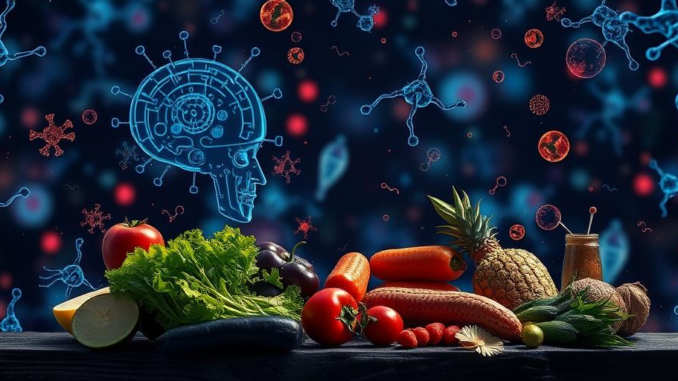
Summary
AI-driven personalized nutrition plans show promise in improving gut microbiome diversity, potentially reducing diet-related health risks. These programs analyze individual data to create tailored diets, promoting a healthier gut and overall well-being. Further research is needed to fully understand the long-term effects and optimize these AI-driven approaches.
** Main Story**
Alright, let’s talk about something I find incredibly fascinating: AI-powered personalized nutrition. You know, we’ve all heard about the importance of a healthy gut – it’s not just about digestion, it impacts our immunity, even our mental well-being! The gut microbiome, that bustling city of microorganisms in our digestive tract, is key. Problem is, general dietary guidelines? They often fall short. One size definitely doesn’t fit all.
That’s where AI comes in, offering a personalized approach that I think is really going to shake things up.
The Allure of Personalized Nutrition
Think about it: each of us reacts differently to food. It’s a complex interplay of genetics, lifestyle, pre-existing health conditions, and, yes, that unique gut microbiome of ours. What works wonders for your colleague might leave you feeling bloated and sluggish. AI, with its ability to crunch massive datasets, can factor all this in.
We’re talking wearable sensor data, food logs, medical histories – all fed into algorithms to create truly tailored dietary recommendations. The goal? Optimizing nutrient intake, fostering a happy and diverse gut flora, and lowering the risk of diet-related diseases. It’s pretty revolutionary stuff.
How AI is Transforming Gut Health, One Byte at a Time
How is AI achieving these tailored diets? Here’s a few ways, for starters:
-
Microbiome Deep Dive: AI can analyze your gut microbiome’s composition. Imagine it as a sophisticated census taker, identifying imbalances and deficiencies that might be contributing to those nagging health issues. This is, in my opinion, the most important thing.
-
Custom-Crafted Diets: Armed with microbiome data and a comprehensive understanding of your individual needs, AI can whip up a personalized diet plan. It’s like having a nutritionist, but one who really knows your gut inside and out. And, crucially, it can factor in your food preferences, allergies, and lifestyle constraints, making it far easier to stick to.
-
Real-Time Guidance and Monitoring: AI-powered apps and devices can become your personal food gurus, offering instant feedback on your dietary choices. A quick scan of a barcode can tell you if that snack aligns with your gut health goals. Plus, they can track changes in your microbiome over time.
Imagine being able to see in real time how your diet is impacting your overall health, its pretty cool right? This allows for continual adjustments to the personalized plan. So, it’s not a one-and-done deal; it’s an evolving strategy.
Early Wins and Where We’re Headed
So, is this just hype? The preliminary evidence is promising. A small pilot study showed that AI-generated tailored diets actually increased gut microbiome diversity and lowered inflammation-associated bacteria.
Admittedly, more large-scale research is absolutely crucial, before we shout this from the rooftops. But, I mean, the early signs are certainly encouraging. It’s hard not to be excited about the possibilities.
AI’s Growing Role in Diabetes Management
But the thing is, AI’s potential goes far beyond just gut health. It’s also making huge strides in diabetes management. And let me tell you, some of these advancements are seriously impressive. Take a look:
Smarter Insulin Delivery Systems:
-
Smart Insulin Pens: Okay, these are pretty neat. They track insulin doses and transmit that data to a smartphone app. For patients and healthcare providers, it’s like having a detailed logbook at your fingertips, providing invaluable insights into insulin usage. It’s about time we started embracing and utilising tech like this.
-
Closed-Loop Systems (The “Artificial Pancreas”): This, to me, is the holy grail. These systems automatically monitor blood glucose levels and adjust insulin delivery accordingly. It’s essentially an artificial pancreas, minimizing the risks of dangerous blood sugar swings. It’s kind of amazing, when you think about it.
New Medications and Approaches:
-
GLP-1 Receptor Agonists: Initially developed for Type 2 diabetes, these drugs are now being explored for potential benefits in Type 1. The more tools we have in the arsenal, the better.
-
Stem Cell Therapy: This is still in the research phase, but imagine using stem cells to generate new insulin-producing beta cells. It could be a potential cure for Type 1 diabetes. Now, that’s something worth investing in.
Other Key Advancements:
-
Inhaled Insulin: For those who hate needles, this is a game-changer. A non-invasive alternative to injections, it can significantly improve patient comfort and adherence. It’s a win-win.
-
Continuous Glucose Monitors (CGMs): These provide real-time glucose data, empowering individuals to take control of their diabetes management. They’re like having a constant window into your blood sugar levels. Once you start using these, it’s hard to imagine living without them.
In conclusion, the merging of AI and personalized nutrition is set to transform healthcare. Especially in gut health and diabetes. As research progresses and technology improves, AI-driven tools and therapies will become essential. They will prevent and manage these conditions, leading to a healthier future. So, it is very important to stay curious and adapt to new changes.


The ability of AI to analyze microbiome composition to identify imbalances and deficiencies is fascinating. How do these AI systems differentiate between transient gut changes (e.g., from a recent meal) and more chronic imbalances requiring dietary intervention?
That’s a great question! Differentiating between transient and chronic imbalances is key. AI algorithms often analyze patterns over time, looking for consistent deviations from a baseline rather than reacting to isolated events like a single meal. Analyzing trends and correlating them with dietary logs helps to avoid false positives and target long-term changes.
Editor: MedTechNews.Uk
Thank you to our Sponsor Esdebe